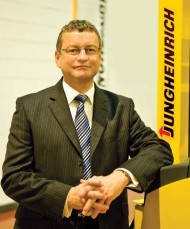 While many industry commentators believe the use of Hydrogen fuel cells within forklifts is getting closer, the reality is that Hydrogen-powered forklifts will not be seen in any significant numbers in Europe for at least ten years.
While many industry commentators believe the use of Hydrogen fuel cells within forklifts is getting closer, the reality is that Hydrogen-powered forklifts will not be seen in any significant numbers in Europe for at least ten years.
That is the view of Bill Goodwin, sales director of Jungheinrich UK Ltd.
Furthermore, Bill Goodwin contends, closer analysis of the assumptions that support many of the claims currently being made for hydrogen raises questions marks over the fuel’s suitability as a materials handling fleet power source and, indeed, over the long term benefits to the environment of forklift users switching en masse to hydrogen powered trucks.
Bill Goodwin comments: “The pro-Hydrogen lobby is hyping the benefits of Hydrogen as a forklift fuel. But, despite its apparently impeccable ‘green’ credentials, as things stand, hydrogen is not a perfect fuel. There are several reasons for this and one of them is environmentally-based: in simple terms, although it is the most abundant fuel on the planet, hydrogen has to be produced as a compressed gas or cooled to a liquid form to be usable. These processes involve the use of other sources of energy and, at the moment, the sources tend to be limited to a choice between traditional fossil fuels (coal, crude oil, natural gas etc), nuclear power and renewable sources such as wind, solar, tidal, geo-thermal and Bio-mass .
“The use of fossil fuels in hydrogen production is clearly counter-productive to the benefits that are central to hydrogen’s attraction, while wind, solar and tidal-based schemes cannot provide anywhere near the kind of energy levels needed for mass production and the growing of crops to provide bio-fuels instead of foodstuffs is ethically questionable. The use of nuclear fuels is, arguably more attractive, but given the UK government reluctance to embrace the nuclear option, it is less suitable for British users.
“It is widely accepted that hydrogen will only become truly attractive as a fuel once it can be produced in such a way that causes zero, or minimal, greenhouse gas emissions and, of course, at a cheaper price than traditional fuels. That scenario remains some years in the future.”
In addition to the doubts surrounding energy- and cost-efficient mass hydrogen production, Bill Goodwin believes that site supply problems, health and safety concerns over the hydrogen refuelling process and the apparent lack of after-market and service back-up available through established hydrogen and hydrogen fuel cell suppliers, will all combine to hold back Hydrogen’s wider take-up as a forklift fuel.
He concludes: “Various stakeholders – including academia, institutions, technology start ups and a few large corporate players – have been investigating the use of hydrogen for some 20 years. Progress has been slow. Indeed, the automotive sector, which at one point was an enthusiastic exponent of the possibilities of hydrogen, has moved away from the technology in recent years.
“The automotive industry’s apparent lack of interest in hydrogen-power has forced the ‘hydrogen community’ to look at alternative adopters and the materials handling sector is seen by the hydrogen power industry as a key future market for its technology.
“However, in Jungheinrich’s opinion, comprehensive and reliable evaluations of the benefits of hydrogen as a fuel source for materials handling equipment have yet to be undertaken.
“So, the lead acid battery currently remains the industry standard forklift power source. Going forward, in the short term, Lithium-Ion batteries will be available with the benefits of rapid charging, long running times and compact dimensions. In the medium term – say, over the next two to three years – Methanol fuel cells will be widely available as a forklift power source.
“Hydrogen could well prove viable as a forklift power source, but because of the issues that still surround it, hydrogen-powered forklifts will not be seen in any significant numbers in Europe for many years.”
Jungheinrich UK Ltd
Craig Johnson, Marketing Manager
Tel: +44 (0) 1908 363100
Email: craigj@jungheinrich.co.uk




Comments are closed.